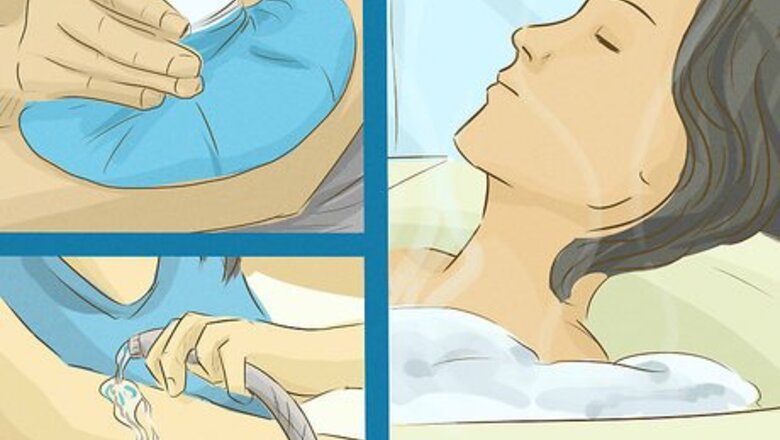
views
Use cold water.
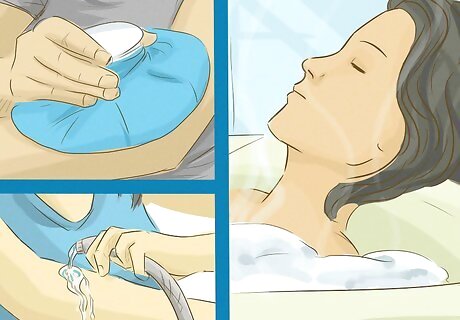
Cold temperatures affect the nerves that cause itch and can sometimes cause them to slow, resulting in relief from itching. Applying cold water to itchy skin can reduce the sensation. Run cool tap water over the affected area. You could also place a cold washcloth on the skin until itching stops. A cold shower or bath can help, especially if the itch covers a large area. Ice packs are a good option as well. You can buy commercial ice packs at most supermarkets or drug stores. Always wrap these in a towel or washcloth and never apply directly to the skin. If you can't find ice packs, you can also place ice cubes in a plastic bag or use frozen vegetables like a bag of peas instead.
Take an oatmeal bath.
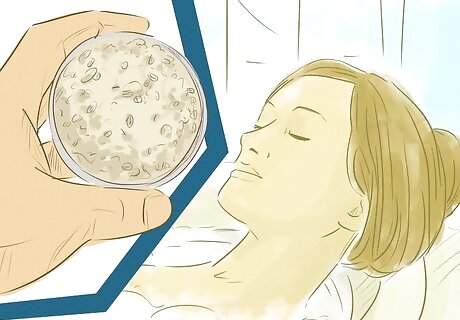
Oatmeal has been shown to soothe the skin for some people, and a cool oatmeal bath might help relieve your itching. Colloidal oatmeal is preferred as it dissolves more easily in the water. However, if that's unavailable you can also use a food processor or blender to grind a cup of unflavored oatmeal. Run a tub of lukewarm water and pour the oats into a tub. Stir to remove any clumps. Soak in the tub for 15 to 20 minutes and, when you're done, pat yourself dry.
Apply aluminum acetate if you suspect poison ivy.
Wet a dressing with an aluminum acetate solution and apply it to the area of your skin that’s itchy. Keep the dressing on your skin for 20–30 minutes at a time. You can use aluminum acetate 4–6 times per day. Rewet the dressings as they dry out if you have weeping skin. You can buy aluminum acetate at your local pharmacy.
Wear the right clothing.
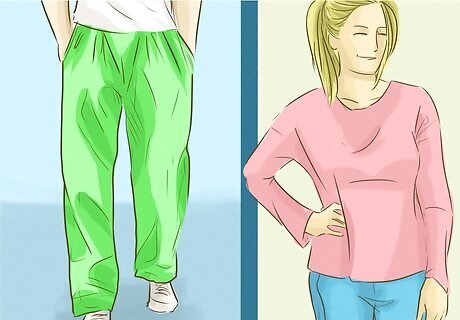
If you have an itch, you should minimize irritation to the area. Oftentimes, the type of clothing you're wearing can make an existing itch worse. Strive for loose-fitting outfits made from smooth textured fabrics. Avoid tight, constricting items of clothing. If possible, choose outfits that do not cover the itchy area. Natural fibers, such as silk and cotton, do not usually irritate itchy skin. Wool is not recommended.
Try over-the-counter anti-itch creams.
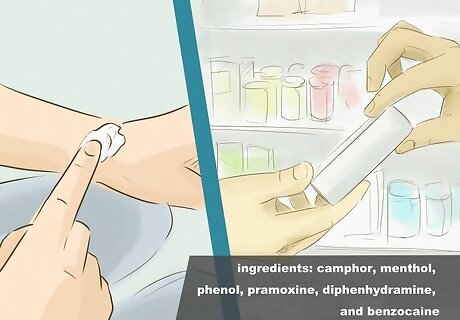
Many itch creams are available for purchase from drug stores and supermarkets. These could help soothe an itch. Opt for a 1% hydrocortisone cream and apply it to the affected area up to 4 times daily for 5–7 days. Look for the following ingredients when selecting creams, as they're particularly effective in combating itch: camphor, menthol, phenol, pramoxine, diphenhydramine, and benzocaine. These remedies numb nerve endings and therefore reduce itching. They can be applied every few minutes until symptoms stop. Try calamine lotion with up to 4% concentration of menthol. You should always be sure to read any warning labels on any products you purchase and check for any potential allergens. Make sure you know what to do in the event of an allergic reaction.
Try oral antihistamines.
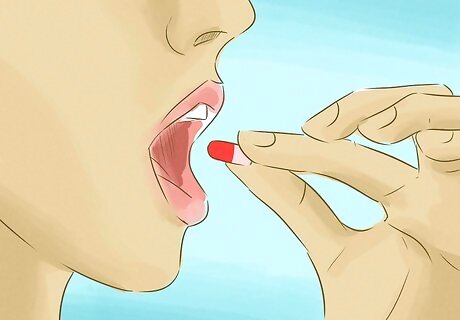
Antihistamines are often the first line of therapy for people with wide-spread itching. Use non-drowsy antihistamines during the day. This will include over-the-counter allergy medications such as 10 mg of cetirizine (Zyrtec) or 10 mg of loratadine (Claritin) once a day for adults. You may take 25–50 mg of diphenhydramine (Benadryl) at night to reduce itching and help you fall asleep. Make sure you talk to your doctor about your itch as only she can determine if it's caused by allergies. If it's caused by other factors, antihistamines may not help you with your itching.
Know when hydrocortisone creams are effective.
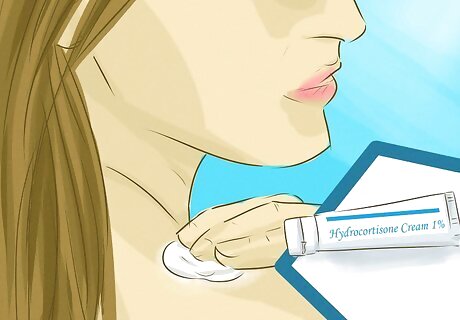
Hydrocortisone creams are a variety of over the counter topical ointments designed to reduce the itch. They can be helpful in some situations but are not always the right option depending on the cause of your itching. Hydrocortisone creams only help ease itch caused by certain rashes, such as eczema. Over-the-counter creams are often somewhat weak, containing only 1% cortisone, but if you have eczema or another skin condition such as seborrhea they might still provide some relief. If your itching is caused by an allergic reaction, bug bites, or dry skin it's doubtful hydrocortisone creams would help at all. As always, only apply over-the-counter creams as necessary and talk to your doctor if you have a reaction.
Apply sunscreen when needed.
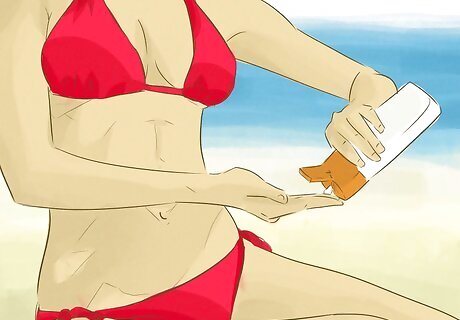
If your itching is caused by sunburn, make sure to apply sunscreen to any exposed skin when going outside. If your skin is particularly sensitive to the sun, avoid sunshine during peak hours. This means anywhere between 10 AM and 2 PM. Peak hours are based on peaks in UV radiation and not sunlight itself. Therefore, the timeframe remains the same year-round. SPF levels are somewhat deceitful. A sunscreen that has an SPF of 50, for example, is not actually twice as protective as one with an SPF of 25. Choose brands based on what they protect against rather than SPF levels. Look for brands that specifically protect against UVA and UVB rays. These are usually labeled "broad spectrum." While SPF levels aren't the best measure of a sunscreen's strength, it's important to understand most dermatologists recommend a sunscreen with an SPF of 30 or above.
Use moisturizers.
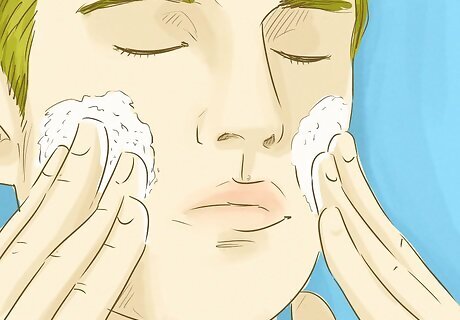
Dry skin can become itchy easily, so using high-quality moisturizers can help reduce the likelihood of skin itch. High-quality moisturizers include Cetaphil, Eucerin, and CeraVe. They can be purchased at most drug stores without prescription. Apply creams once or twice daily, especially when getting out of the shower, after shaving or exercise, or other activities that dry out or irritate skin.
Avoid any known irritants.
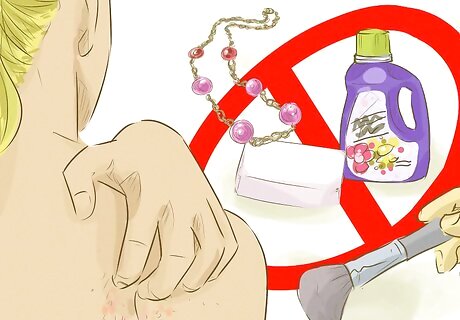
Your itching may be caused by exposure to allergens or skin irritants. If you suspect your skin's itchiness is in response to an irritant, limit your exposure. Common causes of allergic reactions on skin are nickel, jewelry, perfume, skin products with fragrances, cleaning products, and some cosmetics. If itchiness seems to occur in response to a particular product, cease use. Scented laundry detergents are known to cause skin itchiness. Try to buy natural detergents that don't contain added scents. Use mild, unscented soaps, conditioners, and lotions when possible.
Seek medical care when necessary.

Itching is usually not a medical emergency, but if your itching is paired with certain symptoms or is severe you should seek medical care. If your itch is severe enough that it disturbs your sleep, you should see your doctor as soon as possible to determine the cause. If itching lasts more than two weeks and does not improve, you should talk to a doctor. If your itching affects your entire body, seek medical care as soon as you can. See a doctor if itching is paired with symptoms like weight loss, exhaustion, change in bowel habits, fever, or redness and rashes on the skin.




















Comments
0 comment